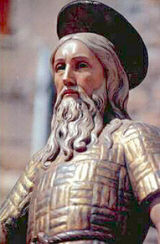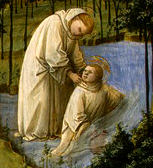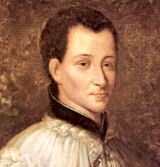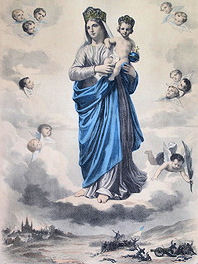
Daily Readings for: January 15, 2013
(Readings on USCCB website)
Collect: Attend to the pleas of your people with heavenly care, O Lord, we pray, that they may see what must be done and gain strength to do what they have seen. Through our Lord Jesus Christ, your Son, who lives and reigns with you in the unity of the Holy Spirit, one God, for ever and ever.
Ordinary Time: January 15th
Tuesday of the First Week of Ordinary Time
Old Calendar: St. Paul, confessor, the first Hermit; St. Maurus, abbot; St. Claude de la Colombiere, religious; Our Lady of Prompt Succor
It was from St. Jerome (+ 420) that the west learned of the life of St. Paul; the book, which he devoted to the life of the first Christian hermit, charmed and instructed generations of the faithful and formed the inspiration of many artists. St. Paul is said to have died in 341, in a hermitage in the region of Thebes in Egypt after having received at the age of 113 a visit from St. Antony.
St. Maurus was one of the first disciples of St. Benedict. In this son of a patrician Roman family, entrusted by his parents to the father of western monasticism, Benedictine tradition celebrates the perfect monk, and the model of childlike obedience. Many monasteries, particularly in France, adopted him as patron. He died about A.D. 580.
The Jesuit Priest St. Claude de la Colombière was the first to believe in the mystical revelations of the Sacred Heart given to St. Margaret Mary in Paray le Monial Convent, France. Thanks to his support, St. Margaret Mary’s superior also believed, and propagation of the devotion to the Sacred heart was started.
In some places today is the feast of Our Lady of Prompt Succor, Patroness of the State of Louisiana.
St. Paul, the first hermit St. Paul is called "the first hermit" in the Missal and Breviary, a rare distinction, for such titles are seldom appended. Our saint was the standard-bearer of those courageous men who for the love of Christ left the world and entered the wilderness to dedicate themselves wholly to contemplation amid all the privations of desert life. The hermits were the great men of prayer in those difficult times when the Church was locked in fierce struggle with heresy after heresy. For centuries the example of their lives served as the school of Christian perfection. Their action set the background for the rise of monasticism and religious orders in the Church.
St. Paul is called "the first hermit" in the Missal and Breviary, a rare distinction, for such titles are seldom appended. Our saint was the standard-bearer of those courageous men who for the love of Christ left the world and entered the wilderness to dedicate themselves wholly to contemplation amid all the privations of desert life. The hermits were the great men of prayer in those difficult times when the Church was locked in fierce struggle with heresy after heresy. For centuries the example of their lives served as the school of Christian perfection. Their action set the background for the rise of monasticism and religious orders in the Church.
The Breviary retains an edifying legend concerning today's saint. One day St. Anthony, then ninety, was divinely inspired to visit the hermit Paul. Though they had never met previously, each greeted the other correctly by name. While they were conversing at length on spiritual matters, the raven that had always brought Paul half a loaf of bread, came with a whole loaf. As the raven flew away, Paul said: "See, the Lord, who is truly good and merciful, has sent us food. Every day for sixty years I have received half a loaf, but with your arrival Christ sent His servants a double ration." Giving thanks, they ate by a spring.
After a brief rest, they again gave thanks, as was their custom, and spent the whole night praising God. At daybreak Paul informed Anthony of his approaching death and asked him to fetch the cloak he had received from St. Athanasius, that he might wrap himself in it. Later, as Anthony was returning from his visit, he saw Paul's soul ascending to heaven escorted by choirs of angels and surrounded by prophets and apostles. Further traditional matter may be found in The Life of Paul the Hermit, written by St. Jerome about the year 376.
Patron: Clothing industry; weavers.
Symbols: Dead man whose grave is being dug by a lion; man being brought food by a bird; man clad in rough garments made of leaves or skins; old man, clothed with palm-leaves, and seated under a palm-tree, near which are a river and loaf of bread; with Saint Anthony the Abbot.
Things to Do:
- Bake a loaf of bread to celebrate this feast, as it is recounted in the Golden Legend how St. Paul received his daily bread every day from God.
- Read St. Jerome's account of the Life of St. Paul.
- The Order of St. Paul the Hermit (Paulines) runs the Shrine of Our Lady of Chestochowa in Doylestown, PA. Read more about the order and if in the neighborhood pay a visit (or a virtual visit) to the Shrine.
St. Maurus In Benedictine history Maurus holds a distinguished place, taught and trained by St. Benedict himself. While still very young, Maurus and another youth, Placid, were brought by their parents to be reared in monastic life by the Patriarch of Monks. An incident reveals Maurus' spirit of childlike obedience. One day Placid was sent to a near-by lake to draw water. Soon he was at the shore, where, boy that he was, he fell victim to his own heedlessness. Eager to fill the vessel quickly, he reached out too far and was dragged in by the rapidly filling jar. He was being borne along by the waves when from his cell St. Benedict realized what had happened. "Hurry, run to the lake! Placid has fallen in!" he called to Maurus. Stopping only for his spiritual father's blessing, Maurus sped to the lake, seized Placid by the hair and brought him ashore.
In Benedictine history Maurus holds a distinguished place, taught and trained by St. Benedict himself. While still very young, Maurus and another youth, Placid, were brought by their parents to be reared in monastic life by the Patriarch of Monks. An incident reveals Maurus' spirit of childlike obedience. One day Placid was sent to a near-by lake to draw water. Soon he was at the shore, where, boy that he was, he fell victim to his own heedlessness. Eager to fill the vessel quickly, he reached out too far and was dragged in by the rapidly filling jar. He was being borne along by the waves when from his cell St. Benedict realized what had happened. "Hurry, run to the lake! Placid has fallen in!" he called to Maurus. Stopping only for his spiritual father's blessing, Maurus sped to the lake, seized Placid by the hair and brought him ashore.
Imagine his shock and amazement when he realized that he had run some distance on water! His explanation? Such a miracle could not have happened save by virtue of his master's command! St. Gregory relates the incident in his Second Book of Dialogues along with much other interesting detail from the life of St. Benedict. The Martyrology makes this comment on the miracle: How greatly he advanced in faith under his teacher (St. Benedict) is attested by an occurrence unheard of since the days of St. Peter; for, on one occasion he walked upon water as though it were dry land. The tradition that Maurus later became abbot at Glanfeuil in France lacks historical support.
Patron: Against cold; against gout; against hoarseness; charcoal burners; cobblers; cold; coppersmiths; gout; hoarseness; shoemakers.
Symbols: Monk saving Saint Placid from drowning while a cowl floats above him; abbot with crozier; abbot with book and censer; holding the weights and measures of food and drink given him by Saint Benedict.
St. Claude de la Colombière Missionary and ascetical writer, born of noble parentage at Saint-Symphorien-d'Ozon, between Lyons and Vienne, in 1641; died at Paray-le-Monial, 15 February, 1682. He entered the Society of Jesus in 1659. After fifteen years of religious life he made a vow, as a means of attaining the utmost possible perfection, to observe faithfully the rule and constitutions of his order under penalty of sin. Those who lived with him attested that this vow was kept with great exactitude. In 1674 Father de la Colombière was made superior at the Jesuit house at Paray-le-Monial, where he became the spiritual director of Blessed Margaret Mary and was thereafter a zealous apostle of the devotion to the Sacred Heart of Jesus. In 1676 he was sent to England as preacher to the Duchess of York, afterwards Queen of Great Britain. He lived the life of a religious even in the Court of St. James and was as active a missionary in England as he had been in France. Although encountering many difficulties, he was able to guide Blessed Margaret Mary by letter. His zeal soon weakened his vitality and a throat and lung trouble seemed to threaten his work as a preacher. While awaiting his recall to France he was suddenly arrested and thrown into prison, denounced as a conspirator. Thanks to his title of preacher to the Duchess of York and to the protection of Louis XIV, whose subject he was, he escaped death but was condemned to exile (1679). The last two years of his life were spent at Lyons where he was spiritual director to the young Jesuits, and at Paray-le-Monial, whither he repaired for his health. His principal works, including "Pious Reflections", "Meditations on the Passion", "Retreat and Spiritual Letters", were published under the title, "Oeuvres du R. P. Claude de la Colombière" (Avignon, 1832; Paris, 1864). His relics are preserved in the monastery of the Visitation nuns at Paray-le-Monial. (Catholic Encyclopedia) He was canonized by Pope John Paul II on May 31, 1992.
Missionary and ascetical writer, born of noble parentage at Saint-Symphorien-d'Ozon, between Lyons and Vienne, in 1641; died at Paray-le-Monial, 15 February, 1682. He entered the Society of Jesus in 1659. After fifteen years of religious life he made a vow, as a means of attaining the utmost possible perfection, to observe faithfully the rule and constitutions of his order under penalty of sin. Those who lived with him attested that this vow was kept with great exactitude. In 1674 Father de la Colombière was made superior at the Jesuit house at Paray-le-Monial, where he became the spiritual director of Blessed Margaret Mary and was thereafter a zealous apostle of the devotion to the Sacred Heart of Jesus. In 1676 he was sent to England as preacher to the Duchess of York, afterwards Queen of Great Britain. He lived the life of a religious even in the Court of St. James and was as active a missionary in England as he had been in France. Although encountering many difficulties, he was able to guide Blessed Margaret Mary by letter. His zeal soon weakened his vitality and a throat and lung trouble seemed to threaten his work as a preacher. While awaiting his recall to France he was suddenly arrested and thrown into prison, denounced as a conspirator. Thanks to his title of preacher to the Duchess of York and to the protection of Louis XIV, whose subject he was, he escaped death but was condemned to exile (1679). The last two years of his life were spent at Lyons where he was spiritual director to the young Jesuits, and at Paray-le-Monial, whither he repaired for his health. His principal works, including "Pious Reflections", "Meditations on the Passion", "Retreat and Spiritual Letters", were published under the title, "Oeuvres du R. P. Claude de la Colombière" (Avignon, 1832; Paris, 1864). His relics are preserved in the monastery of the Visitation nuns at Paray-le-Monial. (Catholic Encyclopedia) He was canonized by Pope John Paul II on May 31, 1992.
Patron: Toy makers; turners.
Things to Do:
- Visit this website for more information about St. Claude.
- Read "Spiritual Direction of Saint Claude De Colombière".
Our Lady of Prompt Succor Devotion to Our Lady of Prompt Succor dates back to 1802, when the Ursuline Order in New Orleans pleaded for help in sustaining the Order with new sisters from France. Their prayers were answered with papal permission for sisters to be transferred from France to New Orleans. In thanksgiving for this favor, the Ursulines dedicated a statue in their convent chapel to Our Lady of Prompt Succor in 1810.
Devotion to Our Lady of Prompt Succor dates back to 1802, when the Ursuline Order in New Orleans pleaded for help in sustaining the Order with new sisters from France. Their prayers were answered with papal permission for sisters to be transferred from France to New Orleans. In thanksgiving for this favor, the Ursulines dedicated a statue in their convent chapel to Our Lady of Prompt Succor in 1810.
In 1812, a terrible fire broke out in New Orleans, and the wind was blowing the flames toward the convent. Prayers before the statue of Our Lady were answered with a reversal of the wind direction and the convent was spared.
During the Battle of New Orleans, in 1815, the sisters again invoked the assistance of Our Lady of Prompt Succor. As the sound of guns and cannons thundered around the chapel during Mass, they vowed to have a Mass of Thanksgiving sung every year if the Americans were victorious. At Communion time, a messenger arrived with the news that Gen. Andrew Jackson's overmatched army had successfully driven the British from the city. Once again Our Lady had responded promptly.
In 1928, the Holy See approved the selection of Our Lady of Prompt Succor as the Patroness of the city of New Orleans and the state of Louisiana. The Mass of Thanksgiving is offered each January 8 at the Shrine of Our Lady of Prompt Succor in New Orleans.
Patron: State of Louisiana; the Archdiocese of New Orleans; City of New Orleans
Things to Do:
- Read more about Our Lady of Prompt Succor at Miracle of the Rosary Mission.